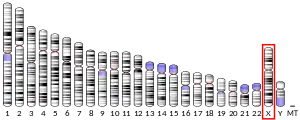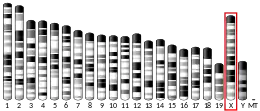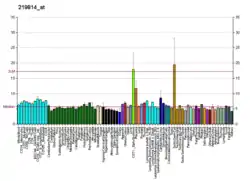MBNL3
Muscleblind-like protein 3 is a protein that in humans is encoded by the MBNL3 gene.[5][6][7]
| MBNL3 | |||||||||||||||||||||||||||||||||||||||||||||||||||
|---|---|---|---|---|---|---|---|---|---|---|---|---|---|---|---|---|---|---|---|---|---|---|---|---|---|---|---|---|---|---|---|---|---|---|---|---|---|---|---|---|---|---|---|---|---|---|---|---|---|---|---|
| Identifiers | |||||||||||||||||||||||||||||||||||||||||||||||||||
| Aliases | MBNL3, CHCR, MBLX, MBLX39, MBXL, muscleblind like splicing regulator 3 | ||||||||||||||||||||||||||||||||||||||||||||||||||
| External IDs | OMIM: 300413 MGI: 2444912 HomoloGene: 23101 GeneCards: MBNL3 | ||||||||||||||||||||||||||||||||||||||||||||||||||
| |||||||||||||||||||||||||||||||||||||||||||||||||||
| |||||||||||||||||||||||||||||||||||||||||||||||||||
| |||||||||||||||||||||||||||||||||||||||||||||||||||
| |||||||||||||||||||||||||||||||||||||||||||||||||||
| |||||||||||||||||||||||||||||||||||||||||||||||||||
| Wikidata | |||||||||||||||||||||||||||||||||||||||||||||||||||
| |||||||||||||||||||||||||||||||||||||||||||||||||||
References
- GRCh38: Ensembl release 89: ENSG00000076770 - Ensembl, May 2017
- GRCm38: Ensembl release 89: ENSMUSG00000036109 - Ensembl, May 2017
- "Human PubMed Reference:". National Center for Biotechnology Information, U.S. National Library of Medicine.
- "Mouse PubMed Reference:". National Center for Biotechnology Information, U.S. National Library of Medicine.
- Squillace RM, Chenault DM, Wang EH (Sep 2002). "Inhibition of muscle differentiation by the novel muscleblind-related protein CHCR". Dev Biol. 250 (1): 218–30. doi:10.1006/dbio.2002.0798. PMID 12297108.
- Miller JW, Urbinati CR, Teng-Umnuay P, Stenberg MG, Byrne BJ, Thornton CA, Swanson MS (Oct 2000). "Recruitment of human muscleblind proteins to (CUG)(n) expansions associated with myotonic dystrophy". EMBO J. 19 (17): 4439–48. doi:10.1093/emboj/19.17.4439. PMC 302046. PMID 10970838.
- "Entrez Gene: MBNL3 muscleblind-like 3 (Drosophila)".
Further reading
- Fardaei M, Rogers MT, Thorpe HM, et al. (2002). "Three proteins, MBNL, MBLL and MBXL, co-localize in vivo with nuclear foci of expanded-repeat transcripts in DM1 and DM2 cells". Hum. Mol. Genet. 11 (7): 805–14. doi:10.1093/hmg/11.7.805. PMID 11929853.
- Strausberg RL, Feingold EA, Grouse LH, et al. (2003). "Generation and initial analysis of more than 15,000 full-length human and mouse cDNA sequences". Proc. Natl. Acad. Sci. U.S.A. 99 (26): 16899–903. Bibcode:2002PNAS...9916899M. doi:10.1073/pnas.242603899. PMC 139241. PMID 12477932.
- Ota T, Suzuki Y, Nishikawa T, et al. (2004). "Complete sequencing and characterization of 21,243 full-length human cDNAs". Nat. Genet. 36 (1): 40–5. doi:10.1038/ng1285. PMID 14702039.
- Ho TH, Charlet-B N, Poulos MG, et al. (2005). "Muscleblind proteins regulate alternative splicing". EMBO J. 23 (15): 3103–12. doi:10.1038/sj.emboj.7600300. PMC 514918. PMID 15257297.
- Gerhard DS, Wagner L, Feingold EA, et al. (2004). "The status, quality, and expansion of the NIH full-length cDNA project: the Mammalian Gene Collection (MGC)". Genome Res. 14 (10B): 2121–7. doi:10.1101/gr.2596504. PMC 528928. PMID 15489334.
- Ross MT, Grafham DV, Coffey AJ, et al. (2005). "The DNA sequence of the human X chromosome". Nature. 434 (7031): 325–37. Bibcode:2005Natur.434..325R. doi:10.1038/nature03440. PMC 2665286. PMID 15772651.
- Self JE, Ennis S, Collins A, et al. (2006). "Fine mapping of the X-linked recessive congenital idiopathic nystagmus locus at Xq24-q26.3". Mol. Vis. 12: 1211–6. PMID 17102799.
This article is issued from Wikipedia. The text is licensed under Creative Commons - Attribution - Sharealike. Additional terms may apply for the media files.




